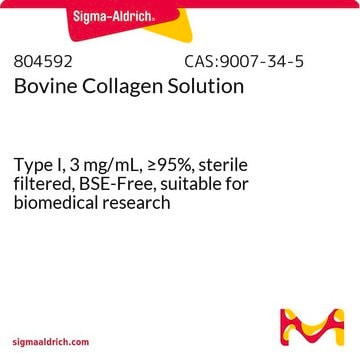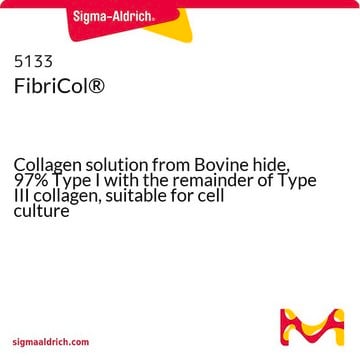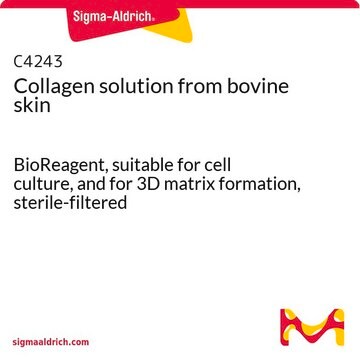5074
Bovine Collagen Type I
from bovine skin, liquid, 5 mg/mL, suitable for cell culture, used for 3D Hydrogel formation, PureCol™ EZ Gel
Synonyme(s) :
Collagen type
About This Item
Produits recommandés
product name
PureCol™ EZ Gel solution,
Source biologique
bovine skin
Niveau de qualité
Stérilité
sterile
Pureté
≥99% (SDS-PAGE Electrophoresis – Silver Stain, SDS-PAGE)
Forme
solid
Conditionnement
pkg of 35 mL
Technique(s)
cell culture | mammalian: suitable
Conditions d'expédition
wet ice
Température de stockage
2-8°C
Description générale
Application
- for coating culture plates to facilitate the seeding and growth of epithelial cells derived from human nasal epithelial tissue
- as a component in the bioartificial tendon preparation, providing a gel matrix for seeding human tendon cells and promoting their growth and collagen gel formation
- for embedding mouse Achilles tendon-derived cells in 3D-collagen constructs, providing a biomimetic environment for studying tendon biology and performing qPCR, immunohistochemical, and western blot analyses.
Caractéristiques et avantages
Notes préparatoires
1. Remove PureCol EZ Gel from 2-10°C storage. To prevent gelation, maintain temperature of product at 2-10°C.
2. Introduce PureCol EZ Gel into cell culture system. Cells can be added to the PureCol EZ Gel solution.
3. To form gel, warm to 37°C. The beginning of gelation will occur within 40 minutes, but allow approximately 90 to minutes for firm gel formation.
Informations légales
Code de la classe de stockage
13 - Non Combustible Solids
Classe de danger pour l'eau (WGK)
WGK 1
Point d'éclair (°F)
Not applicable
Point d'éclair (°C)
Not applicable
Certificats d'analyse (COA)
Recherchez un Certificats d'analyse (COA) en saisissant le numéro de lot du produit. Les numéros de lot figurent sur l'étiquette du produit après les mots "Lot" ou "Batch".
Déjà en possession de ce produit ?
Retrouvez la documentation relative aux produits que vous avez récemment achetés dans la Bibliothèque de documents.
Les clients ont également consulté
Articles
Hydrogela are the most widely used systems for 3D cell culture. Learn more about this technology (what are hydrogels? How to chose?)
Notre équipe de scientifiques dispose d'une expérience dans tous les secteurs de la recherche, notamment en sciences de la vie, science des matériaux, synthèse chimique, chromatographie, analyse et dans de nombreux autres domaines..
Contacter notre Service technique










